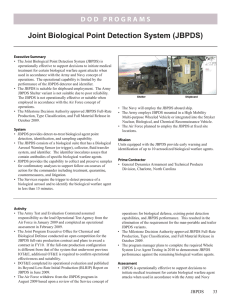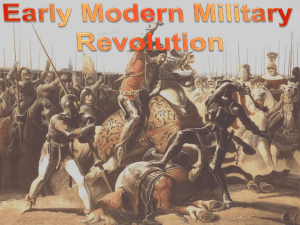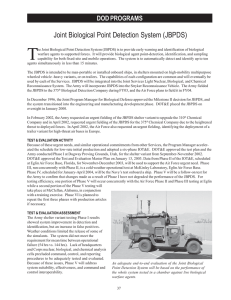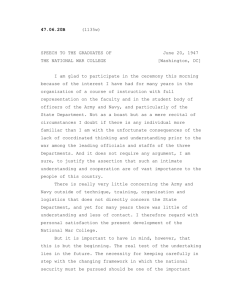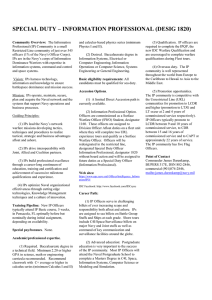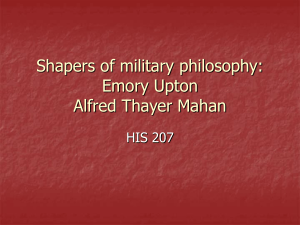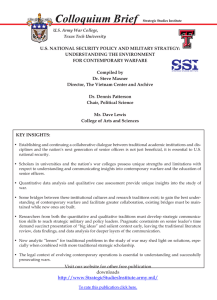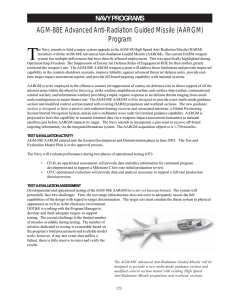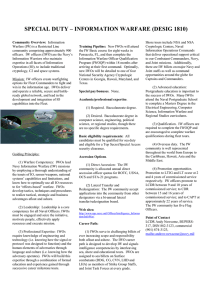Captain Campbell's presentation
advertisement
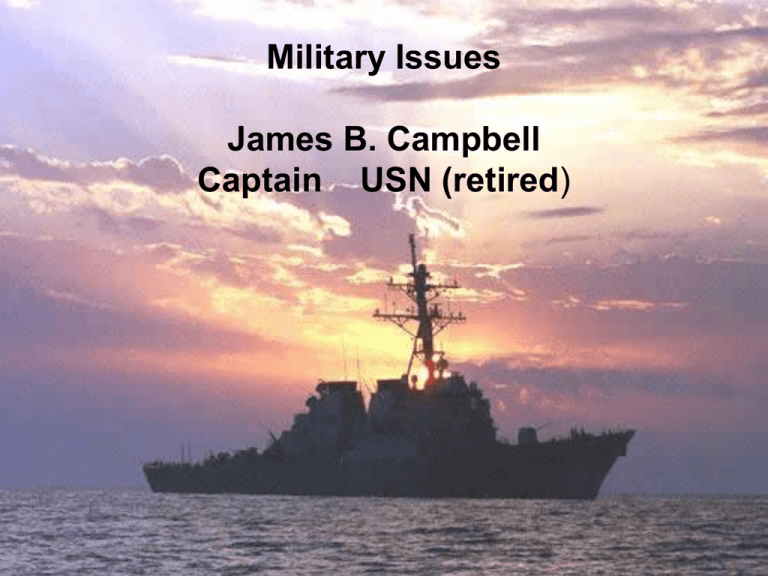
Military Issues James B. Campbell Captain USN (retired) Background • Originally from Arkansas • United States Naval Academy- 1974 • 30 years active duty: retired in 2004 • Most significant assignments and qualifications -Bachelors Degree in Management: Annapolis - Masters Degree in Political Science: AUM -One year residence Air War College, Maxwell AFB -Nuclear Surface Warfare Officer/Professional Nuclear Engineer -Qualified Military Acquisitions Program -Commanding Officer USS THORN (DD 988) -Program Management: Navy Land Attack Program -Program Management: Cruise Missile Defense Systems -Professor of Warfighting: Air War College, Maxwell AFB -Three years assignment with Army; Four years assignment with Air Force So why do young men and women decided to join the military services? • • • • • • Economic opportunities Educational opportunities Patriotism and Service to the Nation Sense of travel and adventure Discipline and maturation Escape from personal situations The Constitution and the Military • Commander in Chief: President of the United States • Congress assigned authority to declare war • Senate approves promotion of all officers • Certain limits on Constitutional Rights of Military members Supremacy of civilian authority over the military dates back to George Washington Should military officers become involved in political affairs—should ex-generals run for President of the United States and advocate political stances ? Societal Cost of Military Services Demographics “It’s just not fair that people that we ask to fight our wars are people who join the military because of economic conditions, because they have few options.” Representative Charles B. Rangel D-New York New York Times March 30, 2003 • • • • • • • Minorities overrepresented Wealthy and underclass underrepresented Officer ranks politically conservative Northeastern region fading from ranks Better educated than population in general Warrior caste Discussions of a new military draft Is the military service a “poor man’s/poor woman’s fight and a rich man’s war”? -National median income for all U.S. households: $41,994 -Mean income for military recruits’ households: $41,141 Source: The Heritage Foundation: Dr. Tim Kane, PhD “The Demographics of Military Enlistment After 911, Executive Memorandum #987 Is the military service a “poor man’s/poor woman’s fight and a rich man’s war”? -National high school level 18-24 years old: 75 percent -Military highs school level 18-24 years old: 98 percent Source: The Heritage Foundation: Dr. Tim Kane, PhD “The Demographics of Military Enlistment After 911, Executive Memorandum #987 Competition Among Services Cultural Differences Should the military services all wear one uniform? Does friction among the services allow healthy competition and better systems or harm the overall good of the nation? Examples: Navy Missiles, Air Force aircraft, Marine Expeditionary systems, and Army M1A1 tanks Competition Among the Military Services “There is no such thing as a separate land, sea or air war; therefore we must now recognize this fact by establishing a single department of the armed forces to govern us all.” General of the Army Dwight D. Eisenhower, 1945 Competition Among the Military Services “There were numerous things throughout the Pacific the Army did not like. One was the apparent fact that the Navy would do anything to keep control. They used higher ranking officers than we had, and so normally retained command. While Naval officers could command an Army outfit, it was seldom an Army officer ever commanded a Navy unit.” General Henry A. “Hap” Arnold, 1946 Ethics in Warfare Jus ad Bellum: (Legality in going to War) Circumstances under which states can wage war “the use of armed force by another State against the sovereignty, territorial integrity or political independence of another state” Principles of right authority, right intention, reasonable hope, proportionality, and last resort What about preemptive war? What about ethnic cleansing and genocide? Ethics in Warfare Jus in Bello: (justice in war and limiting war) “the guidelines for fighting well once war has begun” • Discrimination and non-combatant immunity • Proportionality • Rights of Soldiers Doctrine of Double effects: civilian causalities are justifiable so long as their deaths are not intended and accidental Collateral Damage: destruction unavoidable incurred in the act of destroying a military target Does morality exist in warfare and can one side do what ever is necessary to win? FRICTION OF WAR Force that makes the apparently easy, difficult Action in war is like movement in a resistant element. FOG OF WAR The phrase fog of war was first used by Carl von Clausewitz in reference to how chaotic warfare can seem while one is immersed within it. Discussions Backup Slides

